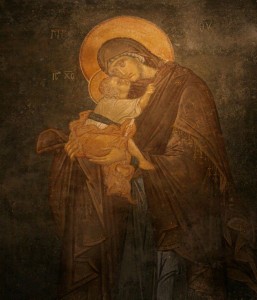By Metropolitan Hierotheos of Nafpaktos
 With the incarnation of Christ we have the manifestation of the Church. The Church becomes the Body of Christ and acquires its Head, Who is Christ. Let us recall the passage in Clement of Rome which we mentioned before, according to which the Church was
With the incarnation of Christ we have the manifestation of the Church. The Church becomes the Body of Christ and acquires its Head, Who is Christ. Let us recall the passage in Clement of Rome which we mentioned before, according to which the Church was
“first created spiritual from above, before the sun and moon, and being spiritual, was manifested in the flesh of Christ”
And St. Maximos the Confessor says characteristically:
“the mystery hidden from the ages and from the generations, was now made manifest by the true and perfect incarnation of the son of God, who united our nature to Himself inseparably and unconfusedly”.
By the incarnation of Christ the human nature which Christ assumed was made divine, and through this the Christians, the members of the Church, are full members of the Body of Christ.
Here too we find the difference between the New and Old Testaments. At this point there needs to be an explanation, so that we can place things in their true dimensions.
We said before that in the Old Testament the holy Prophets attained deification. For according to the teaching of the holy Fathers, and of St. Gregory Palamas as well, the vision of God, which is the vision of the uncreated Light, comes through man’s deification. The man is deified and thus made worthy of seeing the uncreated glory of God. Man cannot see God by his own powers. In the Church we sing:
“in Thy light shall we see light”.
Thus the vision of God comes from within, not from outside, that is to say it takes place through man’s deification. It is not a matter of seeing external things and signs. This is a crucial point in patristic theology. In this sense the holy Fathers speak of the friends of the Cross who existed in the Old Testament, and say that the righteous ones of the Old Testament, such as Abraham, Moses, etc., experienced the mystery of the Cross.
However, this deification of the Prophets was temporary, because death had not yet been abolished, and that is why they were brought to Hades and the vision was outside the Body of the divine human Christ. This is seen in the difference between the experience of the Apostles at the Transfiguration of Christ and the experience which they themselves had on the day of Pentecost.
At the Transfiguration the Disciples saw the uncreated glory of the Holy Trinity in the human nature of the Logos. In order for them to attain this great experience, they had to have been
transfigured beforehand:
“they were changed in turn, and they saw the change”.
This change of the Disciples is identical with deification. Through deification they attained the vision of God, and therefore in the patristic teaching the vision of God is connected with men’s deification. However, although the vision of the uncreated glory of God came from within, that is to say, through deification, nevertheless the Light which poured forth from the Divine human Body of Christ was external to the holy Apostles, since they had not yet become members of the Body of Christ.
At Pentecost we have this great gift. The Disciples saw the glory of God inwardly, that is to say through deification, but also from within the Divine-human Body of Christ, since with the coming of the Holy Spirit they had become members of the Body of Christ. At Pentecost the Body of Christ was not external to the Apostles, as it was at the Transfiguration, but internal, in the sense that the Disciples had become members of the Body of Christ and as members of the Body of Christ they were worthy of this experience.
With the incarnation of Christ the Church became a Body. The Sacraments of the New Testament are different in this way from the Sacraments of the Old Testament. They are performed within the Church, which is the Body of Christ, and they have reference to and conclude in the Sacrament of the divine Eucharist, in which we eat and drink the Body and Blood of Christ. Through the Sacrament of marriage God’s blessing is offered, as in the Old Testament, but at the same time it is linked with the Sacrament of the Divine Eucharist as well, and thus the relationship of the couple is not only a biological unity, but also an ecclesiastical, eucharistic unity. This has great significance and gives a different perspective and a different authentication to the Sacraments.
